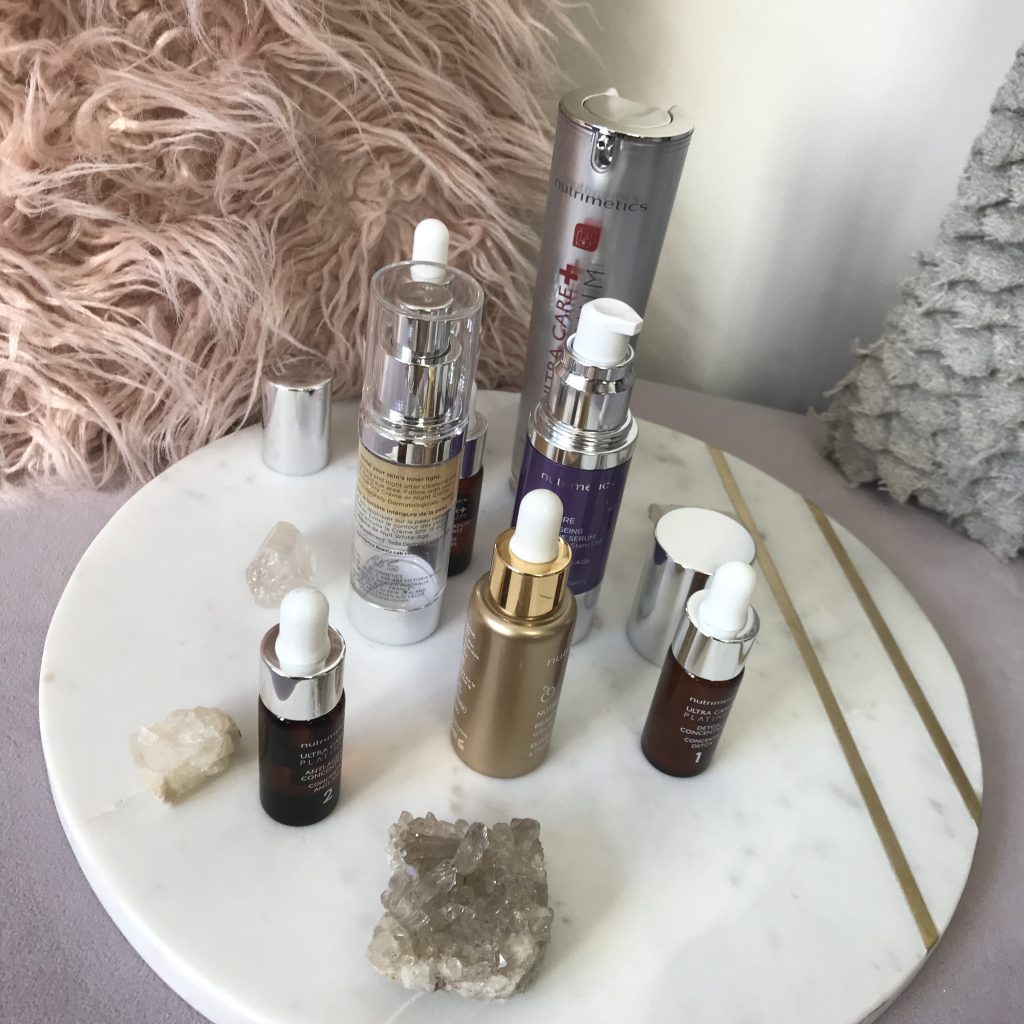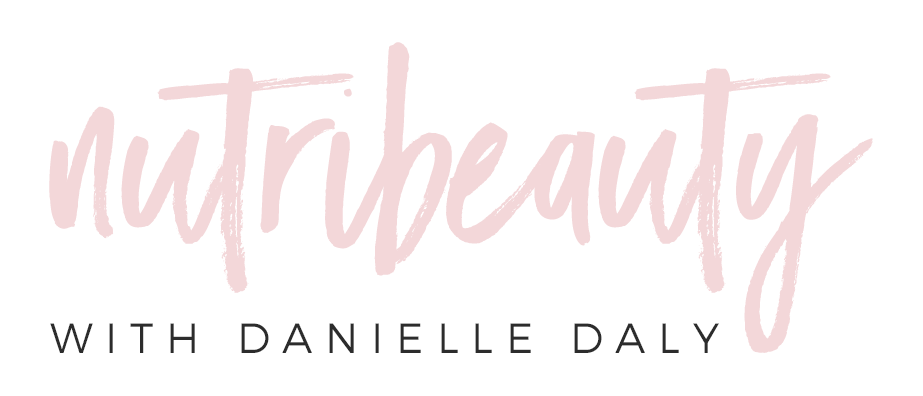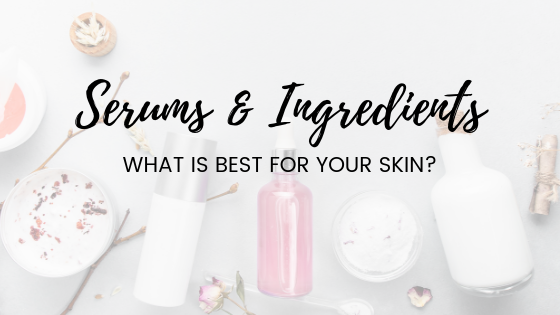Which ingredients work best for common Skin Conditions?
Back by popular demand and following on from my previous post – Skincare & Ingredients
The let’s talk about some common skin conditions, and see what common serum ingredients are best for what skin conditions.
Are you having trouble with any of the following skin conditions?
- Fine lines/wrinkles
- Dullness
- Pigmentation
- Blemishes
- Lack of firmness
Yes? Keep reading, this blog post is for you.
What exactly is a Serum?
Your face serum is basically the powerhouse of your skincare regime. Serums contain only the active ingredients that are needed to make all the magic happen. Using a serum is like using the ‘active ingredient’ in it’s most purest form. When an ‘active ingredient’ is added to a moisturiser, so is all the other stuff including additives etc.. You will also find the percentage of active ingredient/s in your moisturiser is quite low – compared to your serum.
Serums are used after cleansing and toning but before moisturiser. They can be used morning and night and some serums can be used with other as well. Some serums are designed only to be used at night time so make sure you ask the question or read the label properly. Serums are designed to absorb into the skin as they work on a deeper level, so it’s always best to follow with a day or night crème.
If you’re not on board with serums but want amazing skin – get on board!
Different active ingredients will target different skin conditions. Here is a list of some common serum ingredients and also a brief description of what role each ingredient plays.

Vitamin A (Retinol)
There are many different forms of Vitamin A in skincare. For example Retinol is a well known form of Vitamin A, and is most commonly known to help decrease the skins signs of ageing (fine lines and wrinkles). In general most forms of Vitamin A are known to ‘normalise’ the skin. This can help with all kinds of skin conditions including; rosacea, acne, dullness, hydration and of course anti-ageing. A lot of Vitamin A serums are recommended for night use only, so make sure you read the label carefully.
Vitamin B5
Vitamin B5 is anti-inflammatory which makes it great for sensitive skins and also skins that suffer from rosacea, eczema, acne and any skin conditions that cause the skin to become irritated. Also known for it’s healing and hydrating properties, Vitamin B5 can help to combat scarring and help with skin repair.
Peptides
I know I mentioned Peptides in my previous post Skincare & Ingredients and now we’re going to talk about them again. Peptides are one of the most common serum ingredients – and so they should be. Peptides ‘trick’ the skin into producing more collagen and collagen is what is responsible for keeping our skin firm. There are different peptide complexes, some more concentrated than others. Extremely anti-ageing to the skin especially when combined with other age-fighting ingredients.
SPF
Sunscreen Serums – this is new to me. Using a serum made with SPF is a great way to protect your skin using a lightweight formula. Did you know that all the light that reflects off our phones, tablets and computers is just as damaging to the skin? I’m not using an SPF serum myself, however I’m all for lightweight formula with maximum protection.
I’m using the Smart Shield SPF 50+ summer/winter, 365 days a year, it’s amazing. When it comes to SPF in your serum or moisturiser you want to make sure the product is free from other nasties including mineral oil (petrolatum).
The last step in your Daily Skincare Regime should always contain SPF whether that be a serum or a moisturiser.
Stem Cell Technology
Stem Cells can repair any damaged skin cell – which is kind of amazing! They basically stimulate your own cells to function properly and also boost collagen production. Serums made with stem cell technology are highly anti-ageing, they also restore firmness, protect and rejuvenate the skin. Stick to Plant Stem Cell technology to avoid animal derived ingredients as well. You should also expect pretty awesome results from using a serum formulated with stem cell technology.
Vitamin E
Everyone knows that Vitamin E is good for your skin right? I myself have vivid memories of my Nan telling me to use vitamin E on my skin! But do we know exactly why? Vitamin E is an antioxidant that protects the skin. This makes it an excellent ingredient choice regardless of your skins particular condition/s. Antioxidants help repair damaged skin cells and also protect future cells from damage. Broadly used in a lot of skincare products from cleansers to serums and moisturisers.
Botanical Extracts
Botanical Extracts are derived from plants in numerous ways including cold pressing and oil infusion. There are loads of different Botanical Extracts and each one provides different therapeutic properties. For example Grape Seed Extract is high in Vitamin C and E making it a choice ingredient when looking to repair and protect the skin. Botanical Extracts are extremely common on serums and skincare overall. Like I said different extracts will be beneficial for different skin conditions so if you are looking for a serum to target a certain skin condition you could even do a quick google search yourself.
“Active” Ingredients – what makes a product ‘anti-ageing’?
Not only do you want to look at what the active ingredient/s are, something else you want to look at it is the percentage concentrate of the “active ingredient” that the serum is made with. When we purchase skincare essentially what you’re paying for is the active ingredient/s (well let’s hope so!). The more expensive the product – the better it will work, is actually not always the case. There’s a lot of other things your paying for in the price tag including advertising and overheads. When it comes to making your purchases, know your skincare stuff!
I did a little video over on my IGTV Channel about percentage concentrates and what actually makes a product anti-ageing. Check it out, you might find it useful.
Conclusion
Serums make all the magic happen – so make sure you’re using one.
Different active ingredients target different skin conditions. Here is a summary of some of the most common serum ingredients and what skin conditions they’re good for. In my last post Skincare & Ingredients I listed some common skincare ingredients – some commonly used in serums. Be sure to check it out because there’s a little summary checklist that you can download as well.
- Vitamin A (Retinol) – Anti-ageing and skin normalising. Great for fine lines, wrinkles, rosacea and acne.
- Vitamin B5 – Anti-inflammatory, healing and hydrating. A gentle ingredient for sensitive and easily irritated skins.
- Peptides – Boost collagen production which results in firmer skin.
- SPF – Protects the skin from UV damage and skin related conditions including the prevention of future pigmentation.
- Stem Cell Technology – Repair and rejuvenate damaged skin cells. Anti-ageing and skin protecting.
- Vitamin E – Protects and soothes the skin.
- Botanical Extracts – Each Botanical Extract has it’s own therapeutic properties which serve different skin conditions. (I feel another blog post coming on here).
Remember you also want to look at the percentage concentrate of active ingredients, because you want to make sure you’re getting what you pay for. Watch my video on IGTV for a better explanation.
You can also download my Serums & Ingredients – checklist summary and use it for future reference when it comes to serum purchases.
Are you stuck when it comes to skincare? No stress girl, I’ve got your back. Let’s start with a simple Skin Quiz and we can go from there.
You Glow Girl,
Danielle xx
PS – Get in on the skin thing and subscribe

